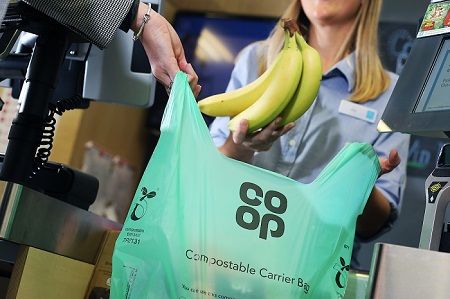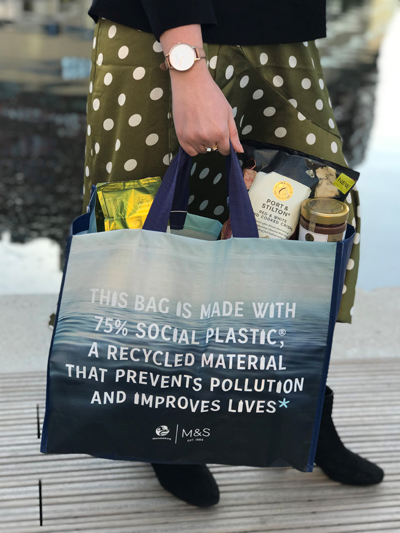National retailers are offering differing alternatives to single-use plastic bags, as both the Co-op and Marks & Spencer are bringing in new initiatives.
The Co-op is rolling-out compostable carrier bags to more than 1,000 of its food stores this week. However, Marks & Spencer has taken a different route and is launching a reusable “eco-shopping bag”.

The new compostable carrier bag. (picture – Neil O’Connor).
And, generally retailers are said to be discussing what approach to take, partly in light of concerns that compostable and biodegradable bags might cause problems for plastics recyclers
Despite what some in the sector may view as a positive step in terms of reducing single-use plastics, there has been some controversy over the best option for retailers to pursue due to problems caused by these materials to plastic recycling.
Compostable
Starting today, compostable bags will initially be available in Co-op stores in areas where they are accepted by the local authority in household food waste collections.
Shoppers can use the compostable bags to carry shopping home, the carriers then have a secondary use as food waste caddy liners, the retailer explained. In a statement, the Co-Op said: “The bags can be turned into compost along with the household food waste, and are approved for home composting.”
The compostable carriers are priced at 5p – the same price as the conventional single-use plastic bags that will be removed.
Commenting on the initiative, Marcus Gover, chief executive at resources charity WRAP, said: “We absolutely need to explore innovative ways of tackling plastic pollution, but there is a balance to ensure initiatives are well thought through and avoid unintended consequences. I’m pleased to see this reflected in the Co-op’s approach to its compostable carrier bag initiative by carefully designing an approach that aligns with existing local collection systems. By everyone moving in the right direction, we can transform the plastic system in the UK and keep plastic in the economy and out of the environment.”
Marks & Spencer
Meanwhile, Marks & Spencer’s work on the plastics front involves the launch of what the retailer calls an “eco-shopping bag” which it says will help prevent waste and reduce poverty among people living in Haiti and the Philippines.
The re-usable bag is made from 75% “Social Plastic”, which is plastic waste that has been collected and recycled by Plastic Bank, a social enterprise which is one of a number of organisations aiming to stop ocean plastic pollution.

Plastic Bank, explained M&S, “incentivises people in Haiti and the Philippines – two areas highly polluted with plastic – to collect waste and take it to one of 36 recycling centres in return for a wage. Collectors can alternatively exchange waste plastic for blockchain digital tokens that can be used to buy essential goods such as food, water, cook stoves and fuel.”
David Katz, chief executive of Plastic Bank, commented: “M&S has powerfully responded to customer demand for sustainable products and created an immediate impact on the lives of our collectors. The M&S team has been incredibly committed to our partnership and thanks to their support, Plastic Bank is empowered to stop more ocean plastic, help more people out of poverty and make responsible production the standard for businesses everywhere. We couldn’t be more pleased to start our journey together.”
Vietnam
Recycling centres in Manila sort the plastic by type and colour and shred it to create flakes, which are exported to Vietnam where the M&S bag is made. Plastic Bank said it has recycled the equivalent of over 100 million plastic bottles since opening its first centre in Haiti in 2014.
The bag has been launched as part of M&S’s Plastics Plan, which includes removing 1,000 tonnes of plastic packaging in less than a year and replacing the 75 million pieces of plastic cutlery given out in its stores each year with FSC certified wood alternatives.
Natalie Tate, product developer at Marks & Spencer said: “We’re reducing the amount of plastic we use as a business and developing smart ways to help our customers reduce the amount of plastic they use. This is a strong, sturdy, practical bag to help our customers with their shop, but with the added benefit of reducing poverty and preventing more plastic getting into our seas by turning waste plastic into a tangible and re-usable item.”
The bag costs £1.30 and will be available across UK stores.
Bio-degradable at Peacocks
November has also seen the launch of a third scheme by fashion retail chain Peacocks. The retailer has announced its plans to switch to “completely bio-degradable bags” across all of its stores commencing this month.
The post Retailers differ over plastic bag alternatives appeared first on letsrecycle.com.
Source: letsrecycle.com Plastic


